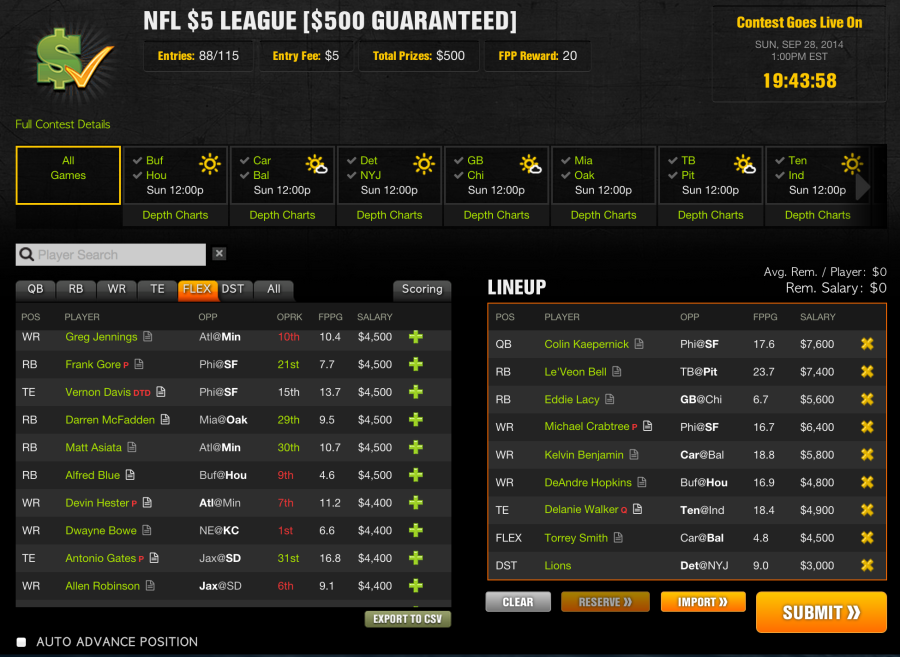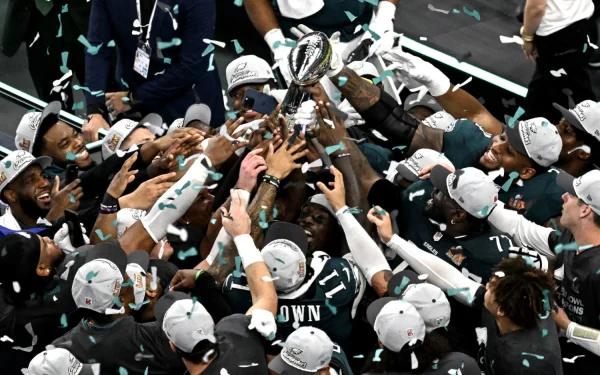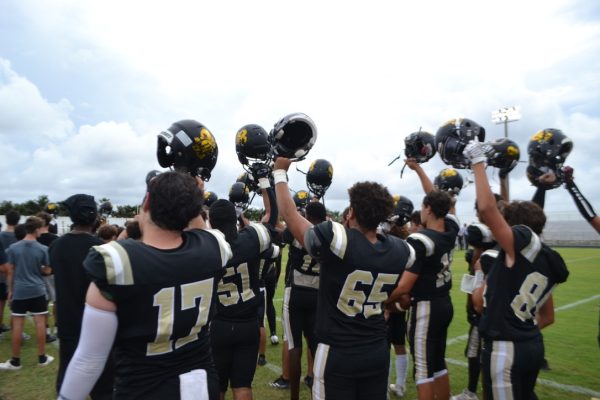Daily Fantasy Sports Sites Coming Under Fire
States considering shutting down DFS as gambling sites
Daily Fantasy Sports (DFS) sites have become extremely popular across the world, but the question of if the sites act within law or not is arising.
The issue that comes into question, according to The Washington Post, is that sports gambling is illegal in most states and that people are putting their hard-earned money into fantasy sport leagues based on real-life games. The controversy is growing because people don’t understand the difference between sports gambling and not as season-long fantasy leagues have not been scrutinized, while DFS sites have been assaulted by scrutiny.
The attorney general of New York, Eric Schneiderman, sent letters to the CEO’s of FanDuel and DraftKings to inform them that he will take the two DFS sites to court and efficiently and effectively shut them down. Because of this case, FanDuel has stopped accepting entries in the Big Apple. However, DraftKings has continued to accept all entries.
Avid sports viewers know that as soon as they go to ESPN.com or to another channel that has anything remotely to do with sports, they will be barraged with advertisements by both FanDuel and DraftKings.
In the DFS games, subscribers pay real money to compete for cash prizes against other subscribers in online daily leagues based on teams they create made from rosters of real players, in which the players amass points based on how they perform in actual games.
The DFS games made it possible for sports fans to risk cash on the games (including hockey, baseball, basketball, soccer, and most commonly American football) in such shocking amounts that critics analogize DFS sites to the illegal act of sports betting.
The controversy arose when on October 6, a DraftKings employee threw $25 into a FanDuel daily football league and ended up walking away big with $350,000. The two companies immediately banned their employees from playing daily fantasy sports.
Lawsuits have become ubiquitous when it comes to the topic of these DFS sites, most frequently, DraftKings and FanDuel.
Washington Redskins receiver Pierre Garcon, on behalf of National Football League (NFL) athletes, has put himself into the mix of a never-ending list of legal issues for FanDuel.
This particular lawsuit states, “[The case] is about FanDuel trying to profit on [Garcon’s] success, and that of other NFL athletes, without compensating them.” FanDuel confirmed that Pierre Garcon was on the payroll to advertise for them, but the strictly-business relationship was soon abandoned.
The suit does not contain any mention of DraftKings. That is because DraftKings signed a licensing and marketing agreement with the National Football League Players Association (NFLPA). FanDuel, on the other hand, does not have a marketing agreement with the NFLPA.
Florida resident David Wallach, a sports and gambling law expert, when asked about this suit in an interview with USA Today’s Brent Schrotenboer, deliberately stated, “Otherwise [DraftKings] would have been sued, too. I see this as an attorney sensing an opportunity and taking advantage of the absence of a licensing agreement.”
Garcon has switched from receiver to linebacker for this case, blindsiding FanDuel and laying on another huge lawsuit against them. Both DraftKings and FanDuel have repeatedly been pounded with lawsuits, along with investigations by the FBI and a criminal grand jury hearing in central Florida.
FanDuel themselves released a statement, claiming the suit has no merit. “There is established law that fantasy operators may use player names and statistics for fantasy contests. We at FanDuel look forward to continuing to operate our contests which sports fans everywhere have come to know and love.”
Many people are beginning to question whether or not these two websites are the right choice for their fantasy sports activities.
Charles McKinnon, an Illinois man, stated, “I am tired of listening to all of this FanDuel [bs]. No sane person would sign up, so just close shop already!”
In an interview with “The Fix,” Chris Grove, the editor of LegalSportsReport.com, stated that only one state, Maryland, has explicitly said that fantasy sports is legal. Arizona, Louisiana, Iowa, Montana, and Washington have banned fantasy football. Arkansas is in a gray area, and the head of Michigan’s gaming commission said in September that he thinks DFS sites are illegal under Michigan law.
One-week fantasy websites like FanDuel and DraftKings are very entertaining money-suckers for the avid football fan, but with the lawsuits piling up, people are starting to believe these companies are fighting a battle that cannot be won.











